Sadie, an imaginative young Dominican American, relates her experiences growing up in her grandmother’s brownstone house in Harlem.
Author: Book Importer
Rin, Rin, Rin / Do, Re, Mi
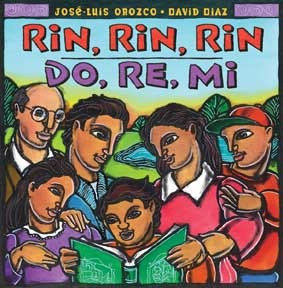 Written in both Spanish and English, a young child asks his parents to “sing to me, say letters to me, rhyme with me, count with me, read with me.” Like Read To Your Bunny, Rin, Rin, Rin/Do, Re, Mi is a book that has two purposes–as a fun picture book and as advice for parents who want to give their children a foundation in literacy. This book features lyrics and music by Jose-Luis Orozco, a beloved performer among Latino communities, as well as wonderful artwork by Caldecott artist David Diaz.
Written in both Spanish and English, a young child asks his parents to “sing to me, say letters to me, rhyme with me, count with me, read with me.” Like Read To Your Bunny, Rin, Rin, Rin/Do, Re, Mi is a book that has two purposes–as a fun picture book and as advice for parents who want to give their children a foundation in literacy. This book features lyrics and music by Jose-Luis Orozco, a beloved performer among Latino communities, as well as wonderful artwork by Caldecott artist David Diaz.
The Key To Grandpa’s House
 Under a smooth gray rock on the outside windowsill of a home in Chimayo, New Mexico, sits la llave–the key–to the home of Grandpa and Grandma Ortega. The key has always been there for family, friends, and neighbors to use. When Grandma Ortega passes away, some things change and some things stay the same. Grandpa now lives alone, but his life is still filled with loving family and friends and la llave is still resting underneath its rock. Cristina Ortega’s latest children’s story represents life on a northern New Mexico plaza while highlighting the respect, friendship, trust, commitment, and love found in the community. Spanish phrases within the text and detailed illustrations by Cristina’s brother, Luis Armando Ortega, combine to demonstrate to children the importance of these timeless values.Reading level: grade 4 and up
Under a smooth gray rock on the outside windowsill of a home in Chimayo, New Mexico, sits la llave–the key–to the home of Grandpa and Grandma Ortega. The key has always been there for family, friends, and neighbors to use. When Grandma Ortega passes away, some things change and some things stay the same. Grandpa now lives alone, but his life is still filled with loving family and friends and la llave is still resting underneath its rock. Cristina Ortega’s latest children’s story represents life on a northern New Mexico plaza while highlighting the respect, friendship, trust, commitment, and love found in the community. Spanish phrases within the text and detailed illustrations by Cristina’s brother, Luis Armando Ortega, combine to demonstrate to children the importance of these timeless values.Reading level: grade 4 and up
The Eyes Of The Weaver: Los Ojos Del Tejedor
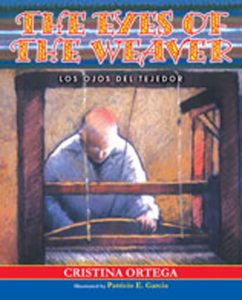 Cristina Ortega is the granddaughter of Juan Melquiades Ortega, a master weaver of northern New Mexico’s Chimayó Valley. Chimayó’s roots are in early Spanish Colonial times and has long been famous for its unique weavings. Juan M. Ortega was taught to weave by his father in the early days when weavers sheared their own sheep and spun and dyed the wool for their blankets. El Tejedor (The Weaver) continued weaving until he was one hundred years old, when his eyesight failed him. In The Eyes of the Weaver, Cristina shares her memories of visits when she was ten years old with Grandpa in the village of Chimayó, where he taught her how to weave. She also recalls how Grandma helped her husband choose color combinations for his Chimayó blankets. It was during these visits that Cristina learned how important it is for a child to listen to and learn from his or her relatives.Some of Juan M. Ortega’s weavings and tools of the trade have been included in the exhibit, “American Encounters,” at the National Museum of American History, Smithsonian Institution, in Washington, D.C.Reading level: 10 years and up
Cristina Ortega is the granddaughter of Juan Melquiades Ortega, a master weaver of northern New Mexico’s Chimayó Valley. Chimayó’s roots are in early Spanish Colonial times and has long been famous for its unique weavings. Juan M. Ortega was taught to weave by his father in the early days when weavers sheared their own sheep and spun and dyed the wool for their blankets. El Tejedor (The Weaver) continued weaving until he was one hundred years old, when his eyesight failed him. In The Eyes of the Weaver, Cristina shares her memories of visits when she was ten years old with Grandpa in the village of Chimayó, where he taught her how to weave. She also recalls how Grandma helped her husband choose color combinations for his Chimayó blankets. It was during these visits that Cristina learned how important it is for a child to listen to and learn from his or her relatives.Some of Juan M. Ortega’s weavings and tools of the trade have been included in the exhibit, “American Encounters,” at the National Museum of American History, Smithsonian Institution, in Washington, D.C.Reading level: 10 years and up
Fiesta Fiasco
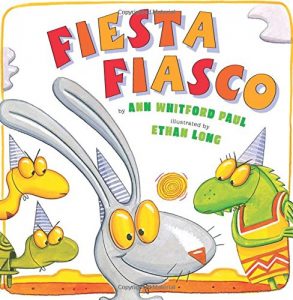 There is another desert party in the works in this spicy companion book to Mañana, Iguana. This time it is Snake’s birthday, and Iguana, Tortoise, and Rabbit are shopping for birthday gifts to bring to his fiesta. But what presents should they buy for Snake? In a sneaky twist, Rabbit convinces them to buy gifts that aren’t for Snake at all—but for him! With a clever text, a spattering of Spanish vocabulary. and lively illustrations, this author-illustrator team presents quite the fiesta fiasco. Glossary included.
There is another desert party in the works in this spicy companion book to Mañana, Iguana. This time it is Snake’s birthday, and Iguana, Tortoise, and Rabbit are shopping for birthday gifts to bring to his fiesta. But what presents should they buy for Snake? In a sneaky twist, Rabbit convinces them to buy gifts that aren’t for Snake at all—but for him! With a clever text, a spattering of Spanish vocabulary. and lively illustrations, this author-illustrator team presents quite the fiesta fiasco. Glossary included.
Count on Culebra: Go from 1 to 10 in Spanish
 A companion to the popular Manana, Iguana that teaches how to count in spanish. When Iguana stubs her toe, Doctor Culebra comes to the rescue. But his suggestions sound a little loco to everyone else. How will tying un rolling pin and dos kettles to Iguana’s tail make her better? And more importantly, will Iguana feel well enough to make her cactus butter dulces? The extremely popular “Manana, Iguana” has sold and reprinted quickly, and Ann Whitford Paul and Ethan Long’s previous titles have received much praise.
A companion to the popular Manana, Iguana that teaches how to count in spanish. When Iguana stubs her toe, Doctor Culebra comes to the rescue. But his suggestions sound a little loco to everyone else. How will tying un rolling pin and dos kettles to Iguana’s tail make her better? And more importantly, will Iguana feel well enough to make her cactus butter dulces? The extremely popular “Manana, Iguana” has sold and reprinted quickly, and Ann Whitford Paul and Ethan Long’s previous titles have received much praise.
First Day in Grapes
All year long, Chico’s family moves up and down the state of California to pick fruits and vegetables. Every September, Chico starts at a new school. Often, the other kids pick on him — maybe because he’s always new, or maybe because he speaks Spanish sometimes. But third grade promises to be different. He likes his teacher, and she recognizes his excellent abilities in math — he may even get to go to the math fair! When some fourth-grade bullies tease him, he surprises them with strengths of his own.
This book has been included in WOW’s Kids Taking Action Booklist. For our current list, visit our Boolist page under Resources in the green navigation bar.
Angel City
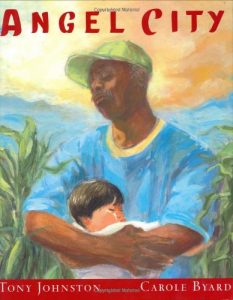 Old man Joseph never imagined a family could start this way. When he finds a baby abandoned on a lonely L.A. street, he vows to raise it as his own. He’s an old farmer and knows nothing of parenting, even less about raising a Mexican baby.Yet Joseph keeps his promise and with time he realizes that even in the darkest barrio, there is a world to explore, songs and stories to be shared. Even in the darkest barrio, there is love.
Old man Joseph never imagined a family could start this way. When he finds a baby abandoned on a lonely L.A. street, he vows to raise it as his own. He’s an old farmer and knows nothing of parenting, even less about raising a Mexican baby.Yet Joseph keeps his promise and with time he realizes that even in the darkest barrio, there is a world to explore, songs and stories to be shared. Even in the darkest barrio, there is love.
Illustrated by Caldecott-Honor Medal winner Carol Byard and beautifully told by Tony Johnston, Angel City is a moving tribute to the strength of family no matter its form.
Play Ball!
Sí, Puedes (Play Ball!)
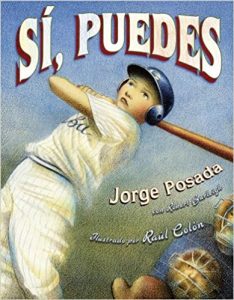 Presents a story of right-handed Jorge Posada being coached by his father to bat left-handed, and how it leads right to the major leagues.
Presents a story of right-handed Jorge Posada being coached by his father to bat left-handed, and how it leads right to the major leagues.
Jorge Posada adora sentir la bola en su guante, el bate en su mano, y el juego del béisbol. Como cualquier otro jugador del equipo Casa Cuba, ya puede batear bien con la mano derecha, pero su padre le dice, “Ser bueno no es ser el mejor.”Su entrenador le dice, “El béisbol es un juego de pulgadas.” De hecho, cuando Casa Cuba tiene que enfrentarse al temible pítcher de Club Caparra, lo que el equipo más necesita es un jugador ambidiestro.Basado en la infancia de Jorge Posada, el cátcher de los New York Yankees, ésta es la historia de un niño puertorriqueño que trabajó duro para convertirse en el mejor, y no se detuvo sino hasta que llegó a ser campeón.

